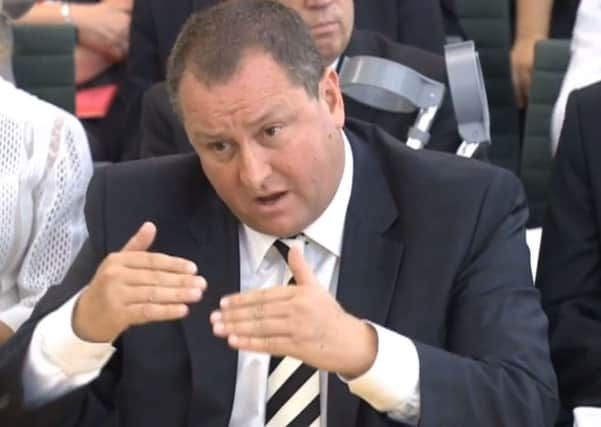Bill Carmichael: Sports Direct's own goal for capitalism


First up was Sports Direct boss Mike Ashley who appeared before MPs on the House of Commons business select committee where he was forced to admit his company may have paid workers below the minimum wage and is now under investigation by HMRC.
Even this extraordinary admission was quickly eclipsed a day later by a series of eye-popping allegations made before the same committee during investigations into the collapse of high street retailer BHS.
Advertisement
Hide AdAdvertisement
Hide AdThe company’s former owner, Dominic Chappell, was accused of “having his fingers in the till” and of threatening to kill a fellow executive after being accused of theft – claims he denies.
It may be tempting after listening to this evidence to conclude that Britain’s business class is full of chancers and that capitalism is broken and needs radical reform. But that would be both deeply unfair and a huge mistake.
The reason Ashley and Chappell have hit the headlines is because they are notable exceptions, rather than the norm.
The vast majority of business people take big risks with their own money and work fantastically hard to turn a small profit in the face of a tsunami of regulations from our own Government and the EU.
Advertisement
Hide AdAdvertisement
Hide AdIf we are ever to recover from the current economic mess caused by unsustainable levels of debt and out of control Government spending, then these are the people who will do it.
If we want taxes to spend on nice things such as schools and hospitals, then we should nurture the successful businesses that will provide those funds.
That is not to say that capitalism is perfect – far from it. Like the individuals who operate within it, it is deeply flawed and there will always be unscrupulous people waiting to take advantage.
But as a way of organising society, free markets are the best things that have ever been tried – and they are particularly beneficial to the poor.
Advertisement
Hide AdAdvertisement
Hide AdDon’t take my word for it – just look at the cold, hard statistics. According to figures released by the World Bank, fully a billion people have been lifted out of extreme poverty in the last 20 years and fewer than 10 per cent of the world’s population now live in this sorry state – the lowest figure since records began.
In particular the Third World has benefitted. There have been dramatic improvements in infant mortality, average life spans and the general health of the population.
These advances have been made not because of windy speeches made at the UN, or through the actions of giant corporate mega-charities such as Oxfam and Save the Children, or by using our bloated foreign aid budget to buy gold-plated Lear jets for African dictators.
No, the answer is far simpler – free markets. Once markets are liberalised, taxes and tariffs reduced, property rights strengthened and barriers to starting a business removed, something quite remarkable happens – poor people through their own hard work and ingenuity begin to make themselves less poor.
Advertisement
Hide AdAdvertisement
Hide AdAnd what is the alternative to free markets? A ‘fairer’ system like socialism? Don’t make me laugh. Whenever socialism has been tried two things invariably happen – the economy collapses and the people are viciously repressed.
Under socialism the political elite certainly thrive and prosper – Robert Mugabe anyone? – but ordinary people always starve.
The only thing you really need to know about socialism is that it fails – every single time, from the Soviet Union, to East Germany, to Poland, to North Korea, to Zimbabwe and Cuba.
The latest poster boy for socialism was Hugo Chavez, the revolutionary leader of Venezuela who died three years ago.
Advertisement
Hide AdAdvertisement
Hide AdNot so long ago left-wingers like Jeremy Corbyn were lining up to praise Venezuela as a prime example of socialist success. But they have all gone quiet now. Why? Because Venezuela has suffered a spectacular collapse with triple-digit inflation and widespread food shortages.
In what should be one of richest countries in the world – because of its huge oil reserves – people are sifting through piles of garbage in a desperate attempt to find enough rotten fruit and vegetables to keep themselves alive. If socialism can completely destroy resource-rich Venezuela, it can destroy anywhere.
Give me free markets any time – even if we have to occasionally deal with characters like Ashley and Chappell.